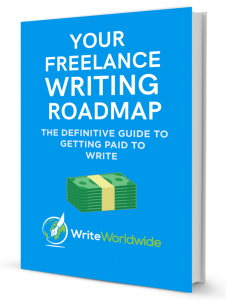Everybody is a freelance writer these days. Well, ok, maybe not everybody.
But it sure does seem like there are a lot of us out there. As we head toward the end of 2017, it’s becoming an increasingly common term in an increasingly crowded space.
So, how do you stand out? There are ways to differentiate yourself.
This year has been a landmark one for me – and all the team at WriteWorldwide – as we’ve worked together to build this community alongside launching our own careers.
To make sure I start next year in the strongest position possible, I’ve been working for the past couple of weeks on rebranding my website, my business model and myself.
For your reading pleasure, here are 5 lessons I’ve learned during the process. Follow the advice here and you’ll (hopefully) have a bunch of useful tips about how to be a freelance writer in 2018 and beyond.
1) Use your name as your domain.
Some of these lessons are going to be about doing things differently to help you stand out. This isn’t one of them. There are a few things that most people do because a) it makes sense and b) it makes things easier. Using your name as your domain is one of those things.
Firstly, it helps because even if you decide to change your entire range of services or go into a completely new line of work, you’ll still be you. Secondly, people aren’t really even buying your services – they’re buying into you. Your personality and style are just as important as what you’re offering to help people with.
So keep it simple, keep it direct, and be yourself! I avoided using my name on my old domain because historically, people like to spell it all kinds of funky ways (shoutout to the pharmacist who once wrote a prescription for Sicily Gigglian). But now I’ve relaunched at cjgilligan.com it’s still short and memorable. Try the same trick if you’ve got a moniker that’s even vaguely complicated – first initial, second initial, last name. Once you’ve found a variation on your name that works, snap it up.
2) Buy your domain through Google, and connect it to Gmail.
In the words of Foo Fighters, I’ve got another confession to make. I was late to the Gmail party. Until very recently, I was using Roundcube as my email interface and it was slooooow. And awkward. And old looking. So, a bit like me.
But it still didn’t suit me, and I was only using it because I was having annoying amount of trouble getting Google to verify the MX Records (which is not a rare vinyl boxset as I originally thought) because I owned my old domain through a separate hosting service. This really halted my progress.
To make sure you don’t have any tech problems stall you, I highly recommend that you keep things simple by buying your domain through Google, and connecting it to Gmail and Gsuite. This way you can make sure you have a professional email (ideally yourname@yourdomain.com) and easily connect your site to tools like Google Docs and Google keyword planner.
3) Describe yourself differently.
Social Media. Facebook Ads. GIFs and Infographics. Content curation. As we head into 2018 and beyond, writing is only part of the job for freelance writers. Sure, it’s true that you need a flair with words and a firm grasp of the basics of language and how to keep your readers interested and get them to take action.
But you also need to get good at a host of other things that have less to do with the written word and more with leading your client through strategy cycles that will help them achieve their business goals and move their brand forward.
This means understanding who they are, where they want to go, and how you can help them get there – which will take something more than writing skills.
If you’re already doing that successfully that’s great, but if you’re just starting out or finding your feet, not calling yourself a freelance writer might be the best way to help you stay afloat in a sea of freelance writers.
4) Go after the work and clients you want, and let the work and clients you want find you.
We’ve written before about content mills, and although it’s not unheard of to pick up the occasional lucrative gig or strong lead from those places (even if if you’re just starting out) we generally advocate staying away from them.
It’s a race to the bottom model, set up to allow legions of desperate writers to be paid peanuts in a self-sustaining loop of low worth and undervalued labour.
To compete with less people, spend some serious time on getting specific about the type of work you want to do and the kind of clients you want to attract.
This will not only increase your confidence, it’ll also help set you apart and make you look – and feel – like you take your worth and talent seriously, and mean business.
5) Strengthen your positioning by highlighting what makes you unique
Branding for freelance writers will be the deciding factor for personal success as the industry moves into 2018 and beyond.
Competition will only get more fierce, and you’ll have to work harder to get noticed, get hired, and make your mark.
But there are ways you can do things differently and establish yourself faster than most.
Ask yourself: what makes you unique as a person? What do love to do, and what are your ultimate freelance writing goals? How does your experience, passion and background make your life interesting?
Then, figure out a way to bring that into your online presence and freelance writing business model.
In my case, I’ve done this by providing three distinct levels of service for clients to choose from.
I’ve also launched The Christmas Copywriter and the We Do Stuff Too community and podcast, both of which I plan to develop over the coming months and into next year.
So, what about you? What makes you unique, and how can you bring that into serving your business and clients? Get it figured out, and then, get it out there!
I hope you’ve enjoyed this guide to how to be a freelance writer in 2018 and beyond. Do you have any plans for your own brand overhaul, or lessons you’ve learned from a recent one? Share them with me in the comments below.
Are you looking for more helpful articles like this?
Visit our "Start Here" Page to find content that appeals to you, wherever you are in your writing journey



